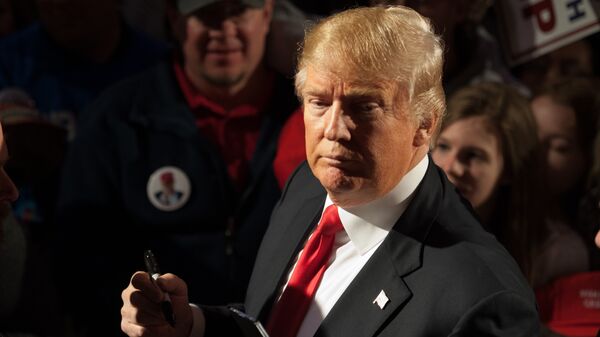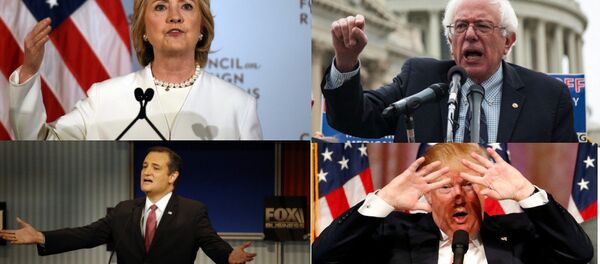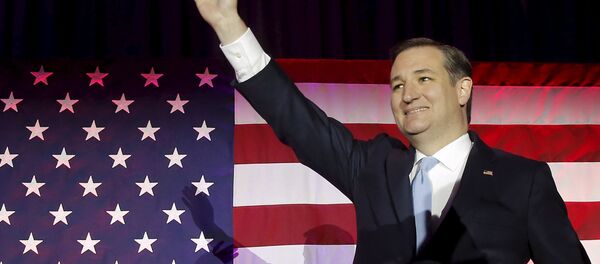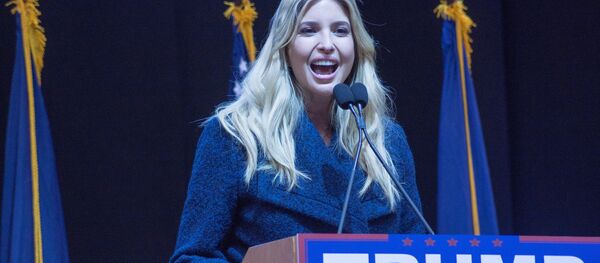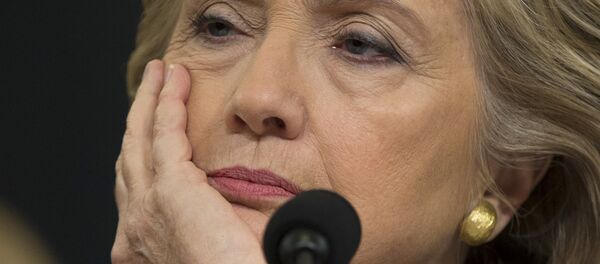Speaking to CNN's Anderson Cooper on Wednesday, Trump noted that his career as a businessman has not stopped him from keeping up with the finer points of US foreign policy, including Washington's relationship with its allies in the North Atlantic Alliance.
"I've been building buildings all my life and doing deals all my life, but I know about NATO. I said it's obsolete, and we're spending too much, and everyone's ripping us off. You have 28 countries and they're ripping us off," Trump said, speaking at a town hall-style event in New York.
The alliance, Trump clarified, is "obsolete because we're looking at the Soviet Union, which doesn't even exist," even if Russia's the USSR's successor, remains "plenty strong."
At the same time, Trump noted, not only has the alliance lost its main enemy; it has also proven itself to be incapable of responding to the central threats facing the world today, terrorism chief among them. "It doesn't cover terror, and if it does cover terror, the wrong countries are in," the candidate said.
Pressed by Cooper on whether he really believed that the alliance was outdated, Trump did not back down. "Of course it's obsolete; it was done 68 years ago and it hasn't changed. And by the way, experts on NATO: they now look and they say Trump is right. These are people that study it."
Indeed, experts and pundits in the US and beyond have reacted to Trump's comments, with detractors such as Bloomberg running a piece evoking the Soviet bogeyman (and putting it side by side with the Nazis), with other experts saying that Trump "might actually have a point."
Donald Trump Is Right About One Thing: NATO Is Obsolete https://t.co/KFBPcaH6FU pic.twitter.com/E9b2n42OBK
— Russia Insider (@RussiaInsider) 14 апреля 2016 г.
For his part, Cato Institute senior fellow Doug Bandow went a step further, noting that the moment when spending on the alliance might have been justified to preserve the 'free world' against the what President Ronald Reagan called the Soviet 'Evil Empire' had "passed long ago – actually even before the end of the Cold War."
What's more, the security analyst noted, by the time the 1980s rolled around, "it was evident that only their own lethargy and stinginess prevented America's friends from taking over most, if not full, responsibility for their own security."
"Today," Bandow suggests, "it is frankly unbelievable that Washington allows its Asian and European allies to continue cowering behind it. That they prefer not to do more is understandable. But that is no reason for America to do it for them."
At the same time, the analyst says, the traditional arguments by Pentagon hawks about global existential threats to US national security are no longer relevant.
"No peer competitor, no ideological context, no contending global power, no countervailing alliance, no cohesive coalition of adversaries, no credible threat to global commerce," none of this actually exists, the analyst notes.
Ultimately, Bandow writes, "whatever past arguments for Washington's role as global policeman, times have changed. The United States should not go to war to protect commercial markets and trading partners. Rather, America's populous and prosperous friends should defend themselves, including their economic interests."
Military Analysts Respond To Trump’s TRASHING Of NATO… Look Who Was Right All Along https://t.co/qRptwy28CF pic.twitter.com/5A4okEecPE
— TRUMPTRAIN (@OnlyHotyP) 7 апреля 2016 г.
How are Russian security experts reacting to Trump's unconventional foreign policy positions? For his part, Yuri Rogulev, the director of the Franklin D. Roosevelt Foundation for US Studies at Moscow State University, says that the candidate's views, while unconventional, are more an honest assessment of realities on the ground than they are revolutionary.
Speaking to Russia's Svobodnaya Pressa online newspaper, Rogulev noted that while no high level US official in office today is willing admit it, "everyone understands perfectly well that the US role as global hegemon is becoming more and more difficult for the US to continue to fulfill."
"It's also obvious why ordinary Americans are becoming less and less optimistic over the exorbitant military expenditures of their government. Throughout most of its history, American society has been dominated by an isolationist sentiment." This has been possible "because the United States is a country which is economically and politically self-sufficient in many respects. All this changed dramatically only since the Cold War, when Americans, for the first time, felt that their geographic location could not save them from a nuclear attack; at that time, they were led to believe that they have a clear and obvious enemy," in the face of the Soviet Union.
"Today, attempts are again being made to instill this threat in Americans' minds, but they have become much less successful. The international situation has changed, and so have peoples' consciousness, and the state of American society."
At the same time, Rogulev noted, "sensible Americans cannot help but to wonder from time to time why NATO has continued to expand, and now has 28 members, when it is not opposed by any [comparable] military-political bloc in the world. After all, the US has to pay for about 80% of all of the alliance's expenditures."
At the same time, "an opposing tendency also exists. Since the collapse of the Soviet Union, Europeans have repeatedly raised the issue of creating a European armed forces, but each time the Americans have nipped this process in the bud. A European military bloc would call into question the need for NATO, and therefore, the political weight of the United States on the world stage would decrease significantly."
Ultimately, so far as European security is concerned, Rogulev explained that even if Washington was serious about the Europeans paying for their own defense, and threatened to withdraw if this did not occur, as Trump proposes, things would not be so easy.
"Today, the situation has become more complicated, because in addition to 'Old Europe', which joined NATO during the confrontation with the Soviet Union, the alliance has also seen the entry of 'New Europe' – Poland, the Baltic countries, Romania, etc." These countries "would not step out against the US in any case, seeing Washington as their patrons. At the same time, they too are in no hurry to pay for their NATO membership."

